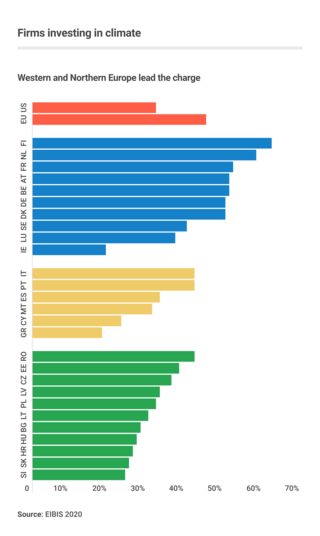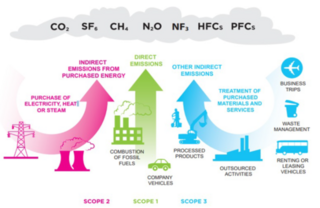Environmental finance is a field within finance that employs market-based environmental policy instruments to improve the ecological impact of investment strategies. The primary objective of environmental finance is to regress the negative impacts of climate change through pricing and trading schemes. The field of environmental finance was established in response to the poor management of economic crises by government bodies globally. Environmental finance aims to reallocate a businesses resources to improve the sustainability of investments whilst also retaining profit margins.
The United Kingdom's Climate Change Programme was launched in November 2000 by the British government in response to its commitment agreed at the 1992 United Nations Conference on Environment and Development (UNCED). The 2000 programme was updated in March 2006 following a review launched in September 2004.

Energy policy is the manner in which a given entity has decided to address issues of energy development including energy conversion, distribution and use as well as reduction of greenhouse gas emissions in order to contribute to climate change mitigation. The attributes of energy policy may include legislation, international treaties, incentives to investment, guidelines for energy conservation, taxation and other public policy techniques. Energy is a core component of modern economies. A functioning economy requires not only labor and capital but also energy, for manufacturing processes, transportation, communication, agriculture, and more. Energy planning is more detailed than energy policy.

Carbon offsetting is a trading mechanism that allows entities such as governments, individuals, or businesses to compensate for (i.e. “offset”) their greenhouse gas emissions by supporting projects that reduce, avoid, or remove emissions elsewhere. In other words, carbon offsets focus on offsetting emissions through investments in emission reduction projects. When an entity invests in a carbon offsetting program, it receives carbon credits, i.e "tokens" used to account for net climate benefits from one entity to another. A carbon credit or offset credit can be bought or sold after certification by a government or independent certification body. One carbon offset or credit represents a reduction, avoidance or removal of one tonne of carbon dioxide or its carbon dioxide-equivalent (CO2e).

Business action on climate change includes a range of activities relating to climate change, and to influencing political decisions on climate change-related regulation, such as the Kyoto Protocol. Major multinationals have played and to some extent continue to play a significant role in the politics of climate change, especially in the United States, through lobbying of government and funding of climate change deniers. Business also plays a key role in the mitigation of climate change, through decisions to invest in researching and implementing new energy technologies and energy efficiency measures.

Food miles is the distance food is transported from the time of its making until it reaches the consumer. Food miles are one factor used when testing the environmental impact of food, such as the carbon footprint of the food.

Carbon accounting is a framework of methods to measure and track how much greenhouse gas (GHG) an organization emits. It can also be used to track projects or actions to reduce emissions in sectors such as forestry or renewable energy. Corporations, cities and other groups use these techniques to help limit climate change. Organizations will often set an emissions baseline, create targets for reducing emissions, and track progress towards them. The accounting methods enable them to do this in a more consistent and transparent manner.

The London Climate Change Agency Limited (LCCA), was a municipal company owned by the London Development Agency (LDA) that worked in partnership with private sector companies to design, finance, construct, own and operate decentralised low energy and zero-carbon projects for London, as well as providing services to others. It operated in the areas of energy, water, waste and transport. In 2009 it was integrated into the London Development Agency.

ClimateCare is a profit for purpose environmental and social impact company known for its role providing carbon offset services, with a particular focus on using carbon and other results based finance to support its 'Climate+Care Projects'. It also provides businesses and governments with sustainable development programmes, environmental and social impact measurement and project development.
The UK Emissions Trading Scheme is the carbon emission trading scheme of the United Kingdom. It is cap and trade and came into operation on 1 January 2021 following the UK's departure from the European Union. The cap is reduced in line with the UK's 2050 net zero commitment.

A zero-carbon city is a goal of city planners that can be variously defined. In a narrower sense of energy production and use, a zero-carbon city is one that generates as much or more carbon-free sustainable energy as it uses. In a broader sense of managing greenhouse gas emissions, a zero-carbon city is one that reduces its carbon footprint to a minimum by using renewable energy sources; reducing all types of carbon emissions through efficient urban design, technology use and lifestyle changes; and balancing any remaining emissions through carbon sequestration. Since the supply chains of a city stretch far beyond its borders, Princeton University's High Meadows Environmental Institute suggests using a transboundary definition of a net-zero carbon city as "one that has net-zero carbon infrastructure and food provisioning systems".

Climate change is impacting the environment and human population of the United Kingdom (UK). The country's climate is becoming warmer, with drier summers and wetter winters. The frequency and intensity of storms, floods, droughts and heatwaves is increasing, and sea level rise is impacting coastal areas. The UK is also a contributor to climate change, having emitted more greenhouse gas per person than the world average. Climate change is having economic impacts on the UK and presents risks to human health and ecosystems.

Climate change in Scotland is causing a range of impacts on Scotland, and its mitigation and adaptation is a matter for the devolved Scottish Parliament. Climate change has already changed timings of spring events such as leaf unfolding, bird migration and egg-laying. Severe effects are likely to occur on biodiversity.

In 2021, net greenhouse gas (GHG) emissions in the United Kingdom (UK) were 427 million tonnes (Mt) carbon dioxide equivalent, 80% of which was carbon dioxide itself. Emissions increased by 5% in 2021 with the easing of COVID-19 restrictions, primarily due to the extra road transport. The UK has over time emitted about 3% of the world total human caused CO2, with a current rate under 1%, although the population is less than 1%.

A climate target, climate goal or climate pledge is a measurable long-term commitment for climate policy and energy policy with the aim of limiting the climate change. Researchers within, among others, the UN climate panel have identified probable consequences of global warming for people and nature at different levels of warming. Based on this, politicians in a large number of countries have agreed on temperature targets for warming, which is the basis for scientifically calculated carbon budgets and ways to achieve these targets. This in turn forms the basis for politically decided global and national emission targets for greenhouse gases, targets for fossil-free energy production and efficient energy use, and for the extent of planned measures for climate change mitigation and adaptation.

The European Green Deal, approved in 2020, is a set of policy initiatives by the European Commission with the overarching aim of making the European Union (EU) climate neutral in 2050. The plan is to review each existing law on its climate merits, and also introduce new legislation on the circular economy, building renovation, biodiversity, farming and innovation.

Sustainable Development Goal 13 is to limit and adapt to climate change. It is one of 17 Sustainable Development Goals established by the United Nations General Assembly in 2015. The official mission statement of this goal is to "Take urgent action to combat climate change and its impacts". SDG 13 and SDG 7 on clean energy are closely related and complementary.

The Health and Care Act 2022 is an act of the Parliament of the United Kingdom, which was created to dismantle many of the structures established by the Health and Social Care Act 2012. Many of the proposals were drafted under the leadership of Simon Stevens and are intended to reinforce the ambitions of the NHS Long Term Plan.

Sustainable healthcare is organised medical care that ensures the health needs of the current population are met, without compromising environmental, economic or social resources for future generations.

Global net zero emissions describes the state where emissions of carbon dioxide due to human activities and removals of these gases are in balance over a given period. It is often called simply net zero. In some cases, "emissions" refers to emissions of all greenhouse gases, and in others it refers only to emissions of carbon dioxide.
















